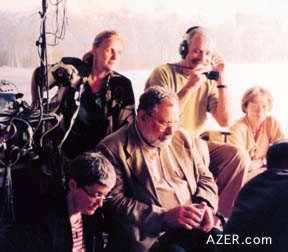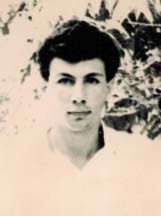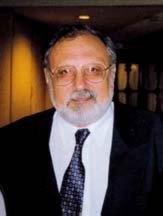|

Winter
1999 (7.4)
Pages
22-23
Famous People:
Then and Now
Rustam
Ibrahimbeyov
Novelist, Screenwriter
and Film Producer
(1939-
)
See Also Cinema and Censorship - A Glimpse
of the Former Soviet Union
Burnt by the Sun - Winner
of Oscar
Rustam Ibrahimbeyov
at age 19 in 1958 and in 1999.
Rustam
Ibrahimbeyov (pronounced roo-STAM ee-brah-him-BEH-yov) is one
of Azerbaijan's most prominent filmmakers. He currently heads
the Filmmaker's Union of Azerbaijan as well as the Confederation
of Filmmakers' Unions (CFU), which represents filmmakers from
the former Soviet republics.
Rustam has written scripts for more than 30 films, including
"Close to Eden", which was nominated for Best Foreign
Film Oscar in 1992. His highest international acclaim came when
the film "Burnt by the Sun" for which he wrote the
screenplay, was awarded the "Grand Prix" at the 47th
International Cannes Film Festival (1994) and the Academy Award
for "Best Foreign Language Film". It was an honor rarely
bestowed, as European cinema and American cinema are based on
very different criteria.
Rustam has recently been elected a member of the American Film
Academy, the first time for an Azerbaijani.
What experiences and interests in childhood would you say shaped
your life and career?
There's no doubt that childhood is the source of what I am
doing today. If a person is not tied to his childhood, then he
can never become a writer, producer or anything else. But I wouldn't
say that there was any one specific event in childhood that shaped
my career.
Actually, when I was young, it never occurred to me that I would
become a writer someday. Of course, books were an integral part
of my life. I read a lot. My parents loved to read, too. I remember
that my mother had books that she was passionate about.
 Rustam
Ibrahimbeyov (center) in Prague with Director Nikita Mikhalkov,
working on the film "Barber of Siberia", 1997. Photo:
Igor Gnevishev. Rustam
Ibrahimbeyov (center) in Prague with Director Nikita Mikhalkov,
working on the film "Barber of Siberia", 1997. Photo:
Igor Gnevishev.
Once when my
brother, Magsud, was in fourth grade, he gave two of my mother's
books to his teacher, the wife of a military officer. That night
when my mother discovered it, she insisted on going to the teacher's
house to get those books back. But the teacher had moved away
from the address that we had and we couldn't find her. My mother
was so disappointed. It was then that I began to understand how
important books could be to a person's life and especially how
dear they were to my mother.
The only childhood event that directly relates to my career happened
when I was 13. I became involved with a drama circle, and we
organized a play called "Hard Task". I had a role in
that play, but it was so hard for me as I was extremely shy.
Perhaps performing in that play somehow influenced my career.
Magsud wrote his first essay when he was 13. It was a short story
about pirates and consisted of 13 double-sided, copybook pages.
After he finished it, the whole family gathered around and he
read it to us. I was 9 years old then. I was amazed by my brother's
ability. But the thought that someday I could also write like
him never crossed my mind.
Actually, I started writing fairly late. I was 24 years old when
I wrote my first story. It was published in the "Azerbaijani
Youth" newspaper in 1963. I started writing while doing
post-graduate studies in cybernetics.
How was your own childhood different from that of kids growing
up today?
We grew up in the street, so I guess my childhood was different
from kids even in my own day who had a more domestic upbringing.
We had to work and earn a living. The street was full of so many
different levels of society and so much diversity.
On the one hand, kids these days are more secure than we were.
Times were very difficult back then. There was real hunger. We
used to collect newspapers and, after we had gathered 20 of them,
we sold them to buy sweets and "blini" (crepes) for
ourselves. Market vendors used the newspapers to wrap their goods
in as there weren't any plastic bags in those days.
Looking back, I'd say that our childhood was pretty severe. But
any problem that is not fatal to man can actually turn out to
be beneficial for him. In that sense, our childhood was wonderful.
These days we are experiencing a very strange situation in society.
Much of our population is very poor, while the rest is quite
well off. This creates awkward situations for kids growing up
today. But the wealthy have their own problems as well - such
as drugs and alcohol - which are no less severe than the problems
that the poor must cope with.
What advice would you give to young people as they enter the
21st century?
When my son was graduating from high school, I gave him the following
advice. It's the same advice I would give today's youth. I told
him that the happiest days of his life were just about over.
Get ready to meet another side of life. Get ready to cope and
overcome the troubles of life.
At school you were always told that love, a career and other
good things in life were within your grasp. You were led to believe
that you would get the best things of life - that you would love
and be loved. You thought that if you worked hard, you could
make a career for yourself. But don't be surprised when the opposite
happens and be prepared to deal with it. Get ready to meet the
woman you will never love. Get ready to be betrayed by your most
faithful friend. Get ready to be treated unjustly by your native
land. Get ready to be denied the things that you deserve. And
in truth, it's absolutely possible to fail in life.
Despite all these disappointments, never lose faith in the good
things in life. Be assured that love and truth and goodness do
exist. But if you don't meet the ideal woman, it doesn't mean
that you can't love another woman and that there is no love in
life at all. The most terrible tragedy of life is cynicism or
despair, so never lose your belief.
When you are on difficult terms with your Motherland and your
government, don't get discouraged and think that you shouldn't
love your nation. If one of your friends betrays you, it doesn't
mean that all your friends are traitors, and that there is no
such thing as friendship. If your beloved betrays you, it doesn't
mean that all women are unfaithful.
A man can try to do his best, and yet circumstances may turn
everything upside down. For whatever we manage to achieve, only
a small portion depends on us; the rest is circumstance and fate.
God gives us paths to walk upon, but we have to choose our own
route. Many things depend on us, but a lot of other things are
determined by God, fate, circumstances or something or somebody
else. That's why you should never generalize or get disappointed.
Despair is the most fatal tragedy of life. Whatever happens,
life is life.
What would you say is your greatest achievement in life? What
do you want to be remembered for most?
According to statistics, 60 years is the average life span for
a man in this part of the world. Since I've lived to be 60, I
think that's my greatest achievement. Most of my childhood friends
have already passed away-only a few are still living. Two of
them are drivers, another has a little shop, the third is an
engineer. That's why I can say that I have taken a lot from life.
There are some people who strive to attain something, like in
boxing or wrestling, where you are concentrated in only one direction.
But in a pentathlon, you have to be able to jump, run, swim and
shoot. I'm a pentathlete-that is, I don't have just one aim in
life. The important thing for me is to create balance between
everything that I do. For example, when I work too much, I get
nervous that I'm missing other important events in life. If I
become extremely involved in family affairs, then I start feeling
like I'm missing out in another direction.
I see life as a canvas on which we create a picture. One's life
and one's deeds make up the content of this composition. Some
people don't think about the picture they are making. They are
just interested in reaching their goals. But it's important for
me to see what I'm drawing in life and what I'm leaving behind.
I want my canvas to be filled with beauty. I'm not so interested
in what I'm going to get out of the picture. I'm not interested
in the result - I'm just interested in its beauty. And so from
this point of view, I'm quite pleased with what I've created
so far.
As for what I want to be remembered for most - I want to be remembered
for my kindness. Simply, I want to be remembered as a kind man.
The century that is coming to an end has really been catastrophic.
You ask: "Why?" Simply because man's scientific and
technical achievements have run ahead of his moral development.
Mankind is like an infant who has been left alone at home with
various kinds of gadgets that he hasn't yet learned how to use.
Mankind's emotional and moral development is lagging behind scientific
and technical development.
Nearly everything that we create leads to the destruction of
nature and humanity. We need to stop this disaster and slow down
its development. All knowledge that we have brings harm to us
while at the same time making life easier and easier. And comfort
leads to the degradation of humanity. That's why I say that the
20th century has been a terrible one. Let's hope that the next
century will bring resolution to some of these problems. Myself,
I greet the 21st century with optimism and hope.
Rustam was
interviewed in December 1999 by Mazahir Panahov and Aynur Hajiyeva.
From Azerbaijan
International
(7.4) Winter 1999.
© Azerbaijan International 1999. All rights reserved.
Back to Index AI 7.4 (Winter
1999)
AI Home |
Magazine
Choice
| Topics
| Store
| Contact
us
|



